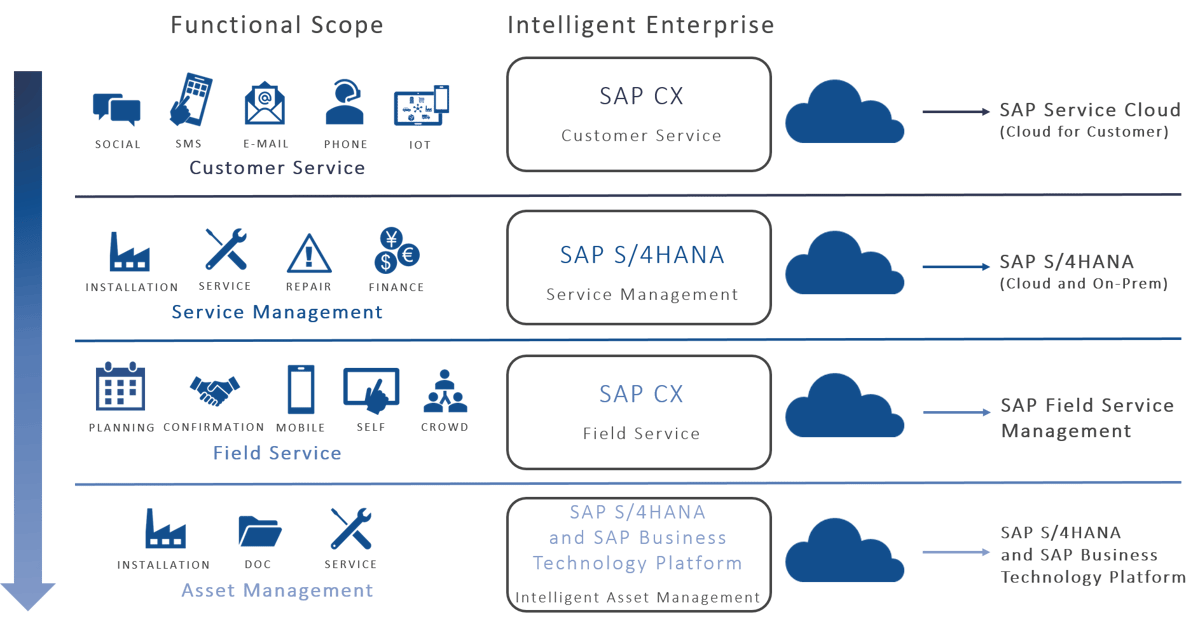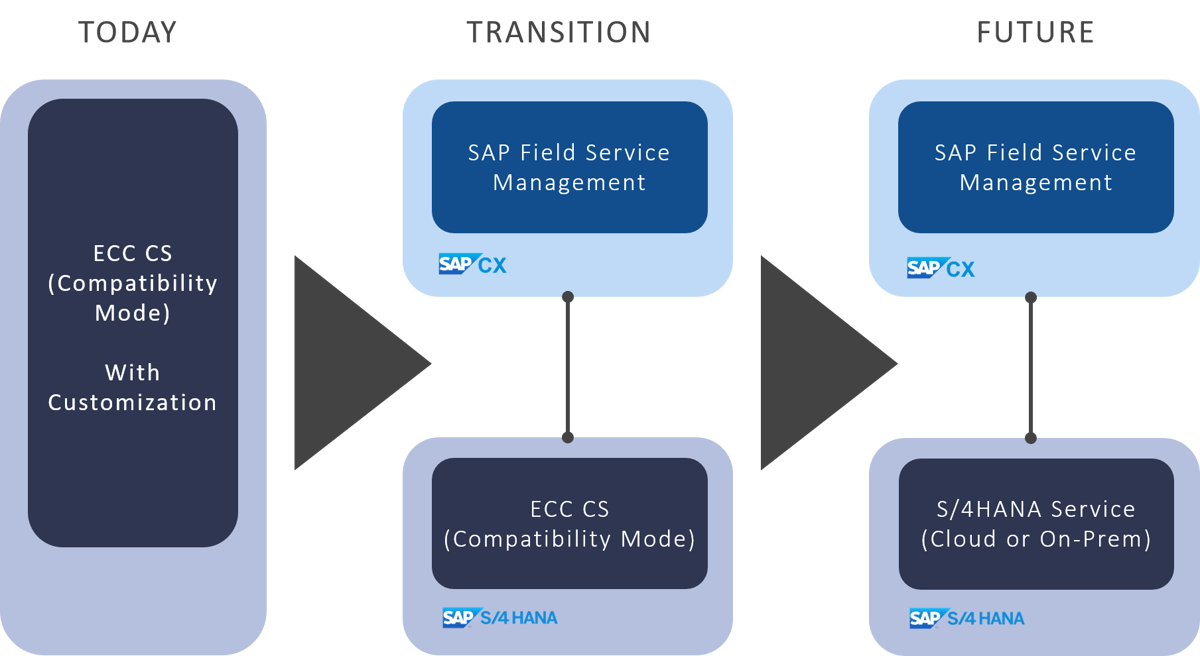SAP Customer Service (CS) is the central module in SAP ERP when it comes to the efficient and professional handling of all customer service processes. However, its time is coming to an end.
This raises the question for companies of a suitable alternative with which they can digitally map their service processes beyond 2030. The task of service transformation gains additional relevance and urgency due to the fact that the fast and efficient processing of service requests contributes significantly to high customer satisfaction and thus represents an important competitive advantage for companies.
Proactive information about maintenance needs (before a machine is down) and the next steps to take
New billing models (use of services for a monthly fee)
Customers’ rising expectations of service are also related to the fact that customers are increasingly transferring many of the conveniences they know and appreciate as consumers from the private sector to the B2B sector. They want to find the same user or customer experience in the business world as they are used to from Amazon or Netflix, for example. Accordingly, companies need to meet these rising expectations with suitable software solutions.
In addition, the technological requirements for mapping service processes are also changing. The advance of cloud technologies is making business departments more independent of IT to a certain extent, as they can independently use cloud technologies for CRM and service. In the course of digitization, many companies are currently making decisions about strategic investments in (cloud) platforms in order to digitize their business processes. Innovative technologies such as machine learning, artificial intelligence and virtual reality need to be combined with existing SAP systems.
 SAP is taking a dual approach to the service strategy of the future. With SAP S/4HANA Service, there is a stable core in which the back-end processes run. Little innovation takes place here, as the processes are similar in most companies and they therefore offer little potential to differentiate themselves from the competition.
SAP is taking a dual approach to the service strategy of the future. With SAP S/4HANA Service, there is a stable core in which the back-end processes run. Little innovation takes place here, as the processes are similar in most companies and they therefore offer little potential to differentiate themselves from the competition.
Various flexible cloud applications are arranged around the core SAP S/4HANA service. These include SAP Customer Experience solutions, such as SAP Service Cloud, which provides omnichannel and ticketing functionalities, and SAP Field Service Management for deployment scheduling and execution. Asset management is also spun off from SAP S/4HANA Service in the SAP strategy. Everything to do with the management of complex assets and installations, predictive maintenance, and the Internet of Things is covered by SAP Intelligent Asset Management. With cloud solutions like these, companies are able to respond quickly to changes that occur and changing requirements. They are highly innovative, enabling them to stand out from the competition and achieve competitive advantages.
 During the transition phase, SAP Customer Service can initially continue to be used in SAP S/4HANA in compatibility mode and functionalities that will no longer be available in SAP S/4HANA Service can be mapped with a product from the SAP CX portfolio and coupled with SAP CS. SAP Customer Service will then be replaced by SAP S/4HANA Service at a later date. There will be two options to choose from.
During the transition phase, SAP Customer Service can initially continue to be used in SAP S/4HANA in compatibility mode and functionalities that will no longer be available in SAP S/4HANA Service can be mapped with a product from the SAP CX portfolio and coupled with SAP CS. SAP Customer Service will then be replaced by SAP S/4HANA Service at a later date. There will be two options to choose from.
Minimizing the impact and migration effort
Retention of the CS process
Replacing the CS objects with extended PM objects
Mapping of the commercial parts of the CS process in SAP S/4HANA Service
Direct use of innovations
Visibility of PM orders
Established processes in a consolidated system landscape
Maximum innovations for CS customers
Process in SAP S/4HANA service with the same functionalities as in SAP CS
Justification of higher migration efforts through resulting innovations and benefits
PM orders as shadow objects (not visible, but necessary for integration)
We make your service fit for the future and ensure that you stand out from the competition when it comes to customer service. End-to-end processes make your service faster, more efficient and more customer-friendly. We accompany your service transformation as a competent expert who not only designs and implements the right service landscape, but also ensures the seamless integration of the various solutions. Our holistic approach ranges from the analysis of your requirements to project implementation. In doing so, we ask the right questions about why, what and how.
Alignment with business
Calculation of TCO and ROI
Demo
Kick-off
Understanding of the current state of the IT landscape
Mapping of business processes
Alignment of requirements with system functionalities (solution fit)
Process optimization and transformation of the business model
Prioritization and validation of the identified building blocks
High-level architecture and cost estimation
Setting up a project plan
Review and commitment
Activities:
|
Results:
|

Activities:
|
Results:
|

Activities:
|
Results:
|

Acitivites:
|
Results:
|

Simply complete the form and submit it. We will get back to you as soon as possible.

With the connection of SAP Customer Experience to the on-premise solutions of SAP CRM, SAP ERP, and SAP S/4HANA you benefit from uni-/bi-directional synchronization of your master data, full integration of transactional scenarios, and integration of field service and support.

From omnichannel communication to a 360° view of your customers and intelligent ticket management, SAP Service Cloud has what it takes to help you increase the efficiency of your service processes and deliver great service experiences to your customers.

No more headaches when planning your service technicians and executing on-site assignments. SAP Field Service Management is a powerful tool for managing all aspects and challenges of your mobile workforce.

In the course of the conversion to SAP S/4HANA, companies need to think about how they will organize and map their customer-related processes in marketing, sales, and service in the future. There are various options for the CRM transformation.

The goal of customer service is to guarantee maximum availability of your machine at the customer's site. A critical success factor for this is the efficient and professional handling of customer inquiries.

Automated service processes bring companies advantages in many ways. The speed at which customer requests are handled increases, as does process efficiency. At the same time, companies reduce their costs and the workload on their service staff.